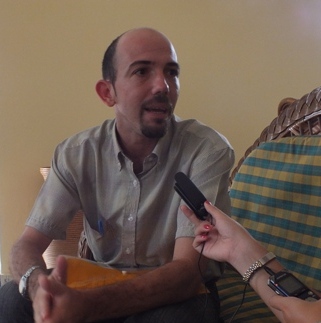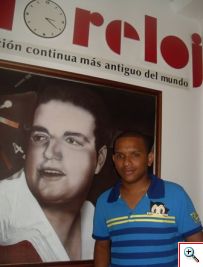Sometimes, we see young people who do several things at the same time and leave us wondering: how do they do it? But, the answer is very simple. When your strength is at its peak and you have enough wisdom, it is not difficult to try your hand in several fields at the same time.
Cuban radio has the privilege of counting on several examples of ordinary people who embark on challenging experiences. This is the case of the young sports narrators/commentators who go through every day with the knowledge that they set the opinion among sports lovers who seek their voices on the dial to be updated.
Two names illustrate the above: Eric Mendilahexon, from Cienfuegos-based Radio Ciudad del Mar and Wilber Pastrana, from the Mayabeque –based Radio Mayabeque.
Eric started in the world of the radio at the age of fifteen, when he dreamed of sharing his sports knowledge with all the listeners. He recalls: “I started as a collaborator commentating basketball games. Later on, I enrolled in several training courses until I could register as a sports narrator/commentator.”
Wilmer also recalls his first steps in the world of sports commenting: “My experience was different. I started as a reporter in my home municipality, Melena del Sur. I have always liked sports very much, so on several occasions I wrote news about baseball. It never crossed my mind that I would become a narrator one day. After the division of the former Havana province, Radio Mayabeque restructured and created, among other things, a team of sports narrators/commentators. The idea of being a member of this team gave me great hopes, so prior to the 51st Baseball National Series; I trained and started to do my first narrations for the people from the Radio.”
Although his current deliveries in front of the microphones make many listeners think they are listening to an experienced voice, these young men respect every rule of the sports narrator/commentator and assure that ethics and respect for the audience are key for their profession.
“A narrator has to be impartial,” says Eric. “In my case, I’ve become impartial without trying. I was born in Villa Clara, moved to Cienfuegos when I was 3 years old and studied in Camagüey. I’ve narrated for several radio stations in a number of provinces, but at the beginning, I followed one team, which was the one my father liked. As time went by, I would defend either, who lose or win, the important thing for me is what’s going on in the game, as long as it is relevant and dignified and helps discover the true essence of the game.”
For his part, Wilber says that talent and a good preparation in all sports, even if he only likes one, are also important to be a sports narrator-commentator. “A sports narrator-commentator can’t do his job following a script. For example, if it is announced that a game is going to be pitched by a certain player and one prepares a comment about the performance of that pitcher during the season, but in the first inning if the other team makes six runs and he is removed, then my commentary is not done and consequently, I have to change the whole script I have prepared the day before and use my knowledge to continue narrating the game.”
It does not matter the sports or the players, for the listener, whether he knows about the game or not, it is important the eloquence of the person narrating the game, the truthfulness of our opinions and judgements, so they can agree and say that something is as it is because the narrator said it.
“It is inevitable to comment while we narrate a game,” says Eric. “That’s why we are called narrator/commentator. Therefore; I tell the audience that it is my opinion before saying what I think. This does not mean that it is a final judgement, because I’m not a judge. I’m just a person that sees things through his glass and focus his comments on the player, not on the individual or the human being behind,” says Eric.
Wilber and Eric share the desire to take listeners to the stadium with their voices and to make them feel as if they were sitting in the stadium cheering their favorite team.
“My biggest goal when I start narrating a game is to make the listener feel, through my description, like he is wearing the cap or the t-shirt of the players , to make them visualize the way the hitter is standing and the game of the third base. If the listener feels as if he were in the stadium with my narration, then I can say I have achieved my goal,” says Wilber.
Eric and Wilber are two young radio-makers who seek the truth at all costs and who are proud of being part of a team that uses every opportunity to turn Cuban sports into a real model for the Cuban people.
Translated by ESTI



